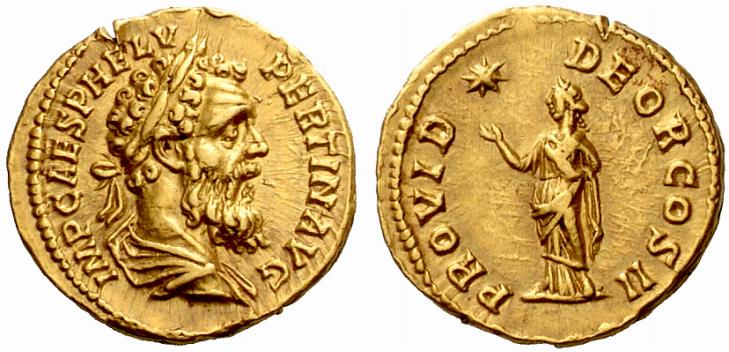March 28, 2016, by Will Leveritt
On this day in AD 193 the Roman emperor Pertinax was assassinated at Rome
Text by Benedict Segal
Publius Helvius Pertinax was born at Alba Pompeia in Liguria on 1 August, 126 the son of Helvius Successus, a man of humble origins who may have been a freedman. His mother’s identity is unknown. Pertinax received a basic Roman education, which led him initially to become a teacher before joining the Roman army as an officer through the patronage of the senator Claudius Pompeianus.

AV aureus of Pertinax. Obverse has laureate head of emperor r., IMP CAES P HELV PERTIN AVG. Reverse has Providentia left, right hand upraised below star, PROVID DEOR COS II. Image kingly courtesy Classical Numismatics Group.
He was appointed the commander of a cohort of Gallic auxiliaries in Syria under Antoninus Pius in which post he served with distinction in the Parthian War which broke out in 162. This led to a promotion as one of the military tribunes of Legio VI Victrix, then stationed in Britain. From there he was transferred to Moesia as the prefect of a cavalry unit; as a man of knightly rank (an eques) Pertinax had thus reached the end of his period of obligatory service.
Around 168 he was moved into the imperial administration as procurator of the alimenta system, whereby poor children received public funds for their upkeep; his area of operation ran along the Via Aemilia in northern Italy.
He was next put in charge of the Roman fleet stationed on the Rhine, before obtaining another procuratorship (in effect a financial officer) in the province of Dacia. Intrigues within the court of Marcus Aurelius led to his dismissal from this post, but when Italy was invaded by Germanic tribes in 170, Pertinax’ old patron Pompeianus engineered his return as his right-hand man to deal with the threat.
The success of this endeavour prompted the emperor to lift Pertinax from equestrian to senatorial rank by enrolling him in the Senate in 174 with the rank of ex-praetor. He was given command of Legio I Adiutrix with which he cleared the provinces of Noricum and Raetia of the marauding Germanic tribesmen.
His achievement resulted in a consulship in 175 followed by a string of governorships – Upper Moesia, Lower Moesia and Dacia – culminating in the governorship of Syria around 180. However, two years later, for reasons that are unclear he was forced to retire to his estates in Liguria by Commodus’ over-mighty Praetorian Prefect, Perennis.
Yet when Perennis fell from power, Commodus sought to not cut ties with Pertinax and called him to the governorship of Britain in 185, emphasising his importance to the imperial powers. At this time Britain’s legions were in an unruly mood. One even mutinied and almost killed Pertinax.
He restored discipline but earned the legions’ resentment; this led him to request removal from his position after a few years. In 188 his long and very varied career was capped with the governorship of Africa.
Then, on 31 December 192 the murder of Commodus changed Pertinax’ life forever: whilst it is unclear whether he knew anything of Commodus’ assassination, he was rumoured to be the preferred choice of the conspirators.
Being asked by the Praetorian prefect Laetus to accept the throne, he was warmly received by the Senate, and so by the son of a freed slave had made it to the throne of the Roman Empire. Cassius Dio tells us he was a conscientious ruler who attempted to plug a large gap in the public finances by selling of the property (especially the luxury items) amassed by Commodus.
Pertinax’ great mistake, however, was in reigning in the licence which the praetorians and imperial freedmen had enjoyed under his predecessor. This caused a good deal of resentment and Laetus and the praetorians sought another man to replace Pertinax with; they settled on the consul Quintus Sosius Falco.
Pertinax catching onto the plot surprisingly decided to pardon Falco claiming that he would see no senator executed during his reign, even for valid reasons. Dio tells us that thereafter Laetus began murdering praetorian guardsmen, claiming to be acting under orders from Pertinax.
A band of soldiers worried they might be next then broke into the imperial palace and confronted the emperor. Pertinax did not seek refuge and spoke bravely to the soldiers; but one of their number would not listen to reason and attacked Pertinax.
His comrades followed, killing the emperor 87 days into his reign. Pertinax was 67 years old. The soldiers cut off his head and paraded it atop a spear. After Pertinax’ death, the empire would be, in effect, auctioned off to the highest bidder by the Praetorian guardsmen. It would be purchased by Didius Julianus.

Excellent article